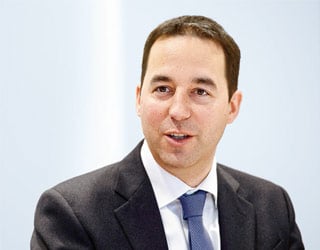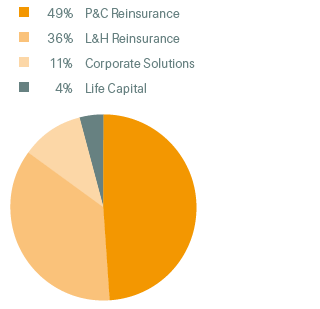Group results
Swiss Re reported a full-year net income of USD 331 million, despite the large natural catastrophes of 2017.

“In a year marked by disasters, Swiss Re could demonstrate the critical role re/insurance plays in enabling people and economies to recover.”
Christian Mumenthaler
Group Chief Executive Officer
Swiss Re’s estimated insurance claims from large natural catastrophes, including Cyclone Debbie in Australia, the Atlantic hurricanes, the Mexican earthquakes and the Californian wildfires amounted to USD 4.7 billion in 2017, net of retrocession and before tax. In 2016, the Group had reported a net income of USD 3.6 billion, incurring natural catastrophe claims of USD 0.8 billion.
Swiss Re’s estimated insurance claims from large natural catastrophes, including Cyclone Debbie in Australia, the Atlantic hurricanes, the Mexican earthquakes and the Californian wildfires amounted to USD 4.7 billion in 2017, net of retrocession and before tax. In 2016, the Group had reported a net income of USD 3.6 billion, incurring natural catastrophe claims of USD 0.8 billion.
Return on equity for 2017 was 1.0%, down from 10.6% in the previous year. Common shareholders’ equity decreased to USD 33.4 billion as of 31 December 2017, a reduction of 3.4% compared to the end of 2016.
Reinsurance generated a net income of USD 679 million, compared to USD 2.9 billion in 2016.
Property & Casualty Reinsurance reported a net loss of USD 413 million in 2017, down from a net income of USD 2.1 billion in 2016. This loss stemmed from estimated insurance claims in the aftermath of a string of large natural catastrophes, which amounted to USD 3.7 billion, net of retrocession and before tax. The net operating margin was –1.3%, compared to 15.4% in the prior-year period.
Life & Health Reinsurance contributed a net income of USD 1.1 billion in 2017, up from USD 807 million in 2016, driven by a stable underwriting result and strong investment performance. The net operating margin increased to 13.1% in 2017 from 10.4% in the previous year.
Corporate Solutions incurred a net loss of USD 741 million in 2017, compared to a net income of USD 135 million in the prior year, significantly impacted by large natural catastrophes, which generated insurance claims of USD 1.0 billion, net of retrocession and before tax. The net operating margin was –23.5% and 4.2% for 2017 and 2016, respectively.
Life Capital delivered a net income of USD 161 million in 2017, compared to USD 638 million in 2016. Large one-off realised gains on the investment portfolio in the prior year were, as expected, not repeated in 2017. As a result, Life Capital’s net operating margin declined to 10.9% in 2017, compared to 27.0% for 2016.
The Group’s net operating margin for 2017 was 2.8%, down from 13.0% in the prior year.
Common shareholders’ equity, excluding non-controlling interests and the impact of contingent capital instruments, decreased to USD 33.4 billion at the end of 2017, down from USD 34.5 billion at the end of 2016. The decline mainly reflected a payment to shareholders of USD 2.6 billion for the 2016 regular dividend and the share buy-back programmes, partially offset by a change in unrealised gains and favourable foreign exchange rate movements.
Swiss Re achieved a return on equity of 1.0% for 2017, compared to 10.6% for 2016. Earnings per share for 2017 were CHF 1.02 or USD 1.03, compared to CHF 10.55 (USD 10.72) for 2016.
Book value per common share stood at USD 106.09 or CHF 103.37 at the end of 2017, compared to USD 105.93 or CHF 107.64 at the end of 2016. Book value per common share is based on common shareholders’ equity and excludes non-controlling interests and the impact of contingent capital instruments.
Business performance
Net premiums and fees earned by business segment, 2017
Total: USD 33.7 billion

Premiums earned and fee income for the Group amounted to USD 33.7 billion for 2017, an increase of 1.4% year-on-year. At constant exchange rates, premiums and fees rose by 1.6%. Gross premiums written decreased in the same period by 2.4% to USD 34.8 billion, driven by a reduction in deployed capacity in Property & Casualty Reinsurance.
Property & Casualty Reinsurance contributed USD 16.7 billion of premiums earned in 2017, a drop from USD 17.0 billion in 2016. The decline was driven by continued underwriting discipline and active portfolio management. The Property & Casualty Reinsurance combined ratio was 111.5% in 2017, up from 93.5% in the prior year due to the severe large natural catastrophe losses, partially offset by favourable prior-year development.
Life & Health Reinsurance premiums earned and fee income totalled USD 12.0 billion in 2017, an increase of 3.9% year-on-year, driven by new business in the Americas and Asia.
Corporate Solutions premiums earned were USD 3.7 billion for 2017, an increase of 4.2% compared to the previous year. The Corporate Solutions combined ratio was 133.4% in 2017, up from 101.1% in the previous year, reflecting the significant natural catastrophe losses in 2017.
Premiums earned and fee income for Life Capital increased by 17.9% to USD 1.4 billion, mainly driven by growth in the open book life and health insurance business. Life Capital continued to generate strong gross cash amounting to USD 998 million in 2017, up from USD 721 million in 2016, benefiting from strong underlying surplus, including an update to mortality assumptions and the finalisation of the 2016 year-end Solvency II statutory valuation.
Investment result and expenses
Swiss Re’s return on investments for 2017 was very strong at 3.9%, compared to 3.4% in 2016. Non-participating net investment income remained broadly stable at USD 3.7 billion. The Group reported non-participating net realised investment gains of USD 1.7 billion in 2017 compared to USD 1.5 billion in 2016, supported by additional realised gains from sales of equity securities, which were partially offset by the absence of gains from derivatives.
Acquisition costs for the Group amounted to USD 7.0 billion in 2017, slightly up from USD 6.9 billion in 2016.
Operating expenses of USD 3.3 billion in 2017 decreased by 1.5% year-on-year.
Interest expenses were USD 566 million, down by 6.6% year-on-year.
The Group reported a tax charge of USD 132 million on a pre-tax income of USD 525 million for 2017, compared to a tax charge of USD 749 million on a pre-tax income of USD 4.4 billion for 2016. This translated into an effective tax rate in the current and prior-year reporting periods of 25.1% and 17.1%, respectively. The tax rate in 2017 was largely driven by profits earned in higher tax jurisdictions, tax charges from foreign currency translation differences between statutory and US GAAP accounts and expenses not allowed for local tax purposes, partially offset by tax benefits of USD 93 million from US tax law changes.